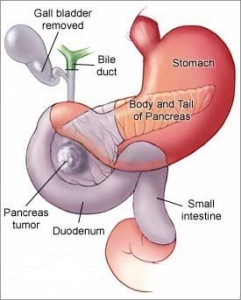Source: Nature Journal; BBC Health
US Scientists at the Howard Hughes Medical Institute and Johns Hopkins University have suggested that Pancreatic cancer may hide in the body for many years before patients fall ill to their disease, which is fatal 95% of the time.
Research hints at earlier opportunities to spot and treat the disease with the first mutations occurring up to 20 years before they become lethal. This aggressive cancer is unresponsive to conventional treatments and has likely metastasized (spread) by the time it is discovered.
In reviewing tissue samples from both primary (originating) tumors and metastatic (spread) tumors, the researchers took all of the genes and placed them in order -looking for mutations (changes in the genetic coding). The average metastatic tumor showed 61 disticnt cancer-related mutations. Of these, 2/3 were also found in the primary pancreatic tumour.
So what does all of this mean? “It means that there is a window of opportunity for early detection of pancreatic cancer,” says Dr. Bert Vogelstein of the Howard Hughes Medical Institute. So how slow is slow? Consider this, the researchers estimated that on average, it took 11.7 years for a single gene mutation in a pancreas cell to become a “mature” pancreatic tumor. Consider this as well, it took another 6.8 years on average before the cancer cells metastasized to another organ.
It is critical to note that once the cancer cells spread, patients had less than 3 years remaining before they passed away from their disease. So 20 years was the average time which patients lived with pancreatic cancer.
So, from start to finish, the development of the disease took more than 20 years on average. Surely medical science has advanced to the point where we can find pancreatic cancer within 20 years and save more lives? Surprisingly, not quite yet. Research such as this, which is underfunded (no one is paying for it) is not plentiful and the focus ultimately becomes upon surgical and chemotherapy (drug) advances rather than finding cancer earlier.
Chief executive Maggie Blanks rom the UK’s Institute of Cancer Research, has stated, “Survival rates have not improved in the past 40 years and whilst (while for those in the US) the disease is the UK’s fifth biggest cause of cancer death, it receives less than 2% of overall research funding.”
The Estimated number new cases of pancreatic cancer in the United States for 2010 is 43,140, resulting in 36,800 deaths. Pancreatic cancer is currently one of the only cancers not demonstrating any increase in survival rates.
~Posted by D.M. Schwadron, Esquire
